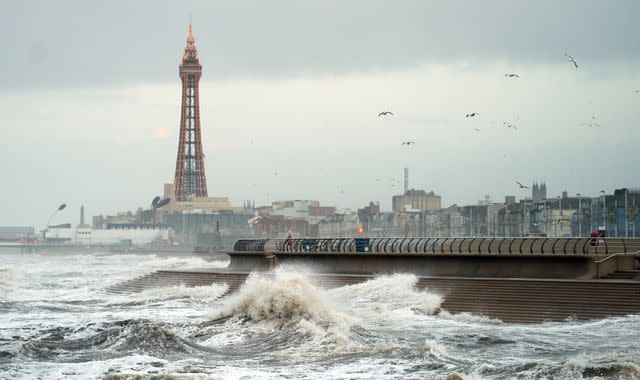Two people die in crashes during Storm Isha

Two people have died following car collisions with fallen trees as a result of Storm Isha, which has brought winds topping 100mph to the UK.
An 84-year-old man in Scotland died after a car collided with a fallen tree, while another man in his 60s died in a road collision involving two vans and a collapsed tree in Limavady, Co Londonderry, Northern Ireland on Sunday.
Police in Scotland say the man - a front-seat passenger - was pronounced dead at the scene in Grangemouth on Sunday night, while others in the car were unhurt.
It comes as weather forecasters in Ireland have named a new storm for Tuesday as Jocelyn, which is expected to have a greater effect on the country than the UK.
Met Eireann said conditions will be "wet and stormy" as Jocelyn "tracks to the northwest of Ireland".
With Isha's effect felt across the UK, commuters faced travel disruption on Monday, while tens of thousands have been left without power.
Rush-hour trains were axed for many as more cancellations and delays are expected for rail, air and sea travellers.
Key points:
• Wind-speed of 107mph clocked in Scotland;
• Network Rail has imposed 50mph speed restrictions across most routes;
• Scot Rail cancelled all rush-hour trains and services may not resume until "later on Monday";
• Sellafield nuclear site closed on Sunday as a precaution.
A Met Office yellow warning for wind covering Scotland, Northern Ireland, Wales and northern and central England is active from 4pm on Tuesday until 3pm on Wednesday.
An amber warning has been issued for strong winds across the north and west of Scotland from 6pm on Tuesday until 8am on Wednesday - and a yellow warning for heavy rain across western parts of the country from 7am to 6pm on Tuesday.
At least 30,000 people have no power across the north of England and Scotland, with another 40,000 affected in Northern Ireland, according to Lawrence Slade, the chief executive of the Energy Networks Association.
A yellow warning for wind was in place for the entire UK until midday, after the Met Office had issued two amber wind alerts and a red warning for parts of northern Scotland, which have since expired.
At its height, the storm brought winds gusting up to 107mph on the Tay bridge in Scotland.
The storm caused damage to homes and buildings, power cuts, flying debris, large waves and even some flooding in places, and downed trees.
Power down for thousands
In northwest England, winds of up to 80mph caused widespread damage and 8,500 properties remain without power, according to Electricity North West.
Scottish and Southern Electricity Networks (SSEN) said weather conditions were "more severe than initially forecast", with "full network restoration not expected today" and 10,500 properties having no power supply as of 8.45am.
Get the five-day forecast where you are
Agencies across Cumbria declared themselves on standby for a major incident, with Sellafield nuclear site closing as a precaution on Sunday.
Someone was treated at the scene after being struck by falling debris when scaffolding became dislodged in Belfast.
The Met Office said "everybody" has been affected by the storm, while heavy downpours battered some places with 28 flood warnings in place in England and 50 in Scotland.
Travel disruption
Network Rail has imposed 50mph speed restrictions across most routes to keep passengers and trains safe from falling trees and debris blown onto tracks.
Scotland's railway operator cancelled all of its rush-hour trains and passengers were warned services may not resume until the afternoon.
The remains of a garden shed were blown on to the line at Bellgrove station in Glasgow and a small fire broke out after a tree fell on overhead wires in Gartcosh, Cumbernauld, Network Rail said.
A wall and fence were blown on to the line at Glasgow Queen Street, while the River Tay breached safety limits at the Dalguise Viaduct on the Highland Mainline, forcing the overnight watchman to abandon the site.
UK weather: The latest Sky News forecast
Further south, there were no LNER trains north of Newcastle until midday and East Midlands Railway said delays and alterations to its services were "likely".
Meanwhile, air traffic control restrictions were in place, leading to flight cancellations and causing some planes to divert.
Ryanair flights to Dublin from Manchester and Lanzarote in the Canary Islands diverted to Paris and Bordeaux, respectively.
A TUI flight from Sharm el Sheikh to Glasgow Airport declared an emergency and was diverted to Manchester.
The Tornado and Storm Research Organisation (Torro) had warned a tornado was "possible" in England and Wales.
A "tornado watch" zone was in place for Northern Ireland, as well as parts of Scotland and northern England, but expired late on Sunday.
Cold Arctic air pushing south into North America is making the jet stream more active, the Met Office said, and because it flows from west to east, it is bringing stormier weather to the UK.
Read more from Sky News:
Police failures have left paedophile ring at large for seven years, whistleblower claims
Sarah Ferguson, Duchess of York, diagnosed with skin cancer
Storm Isha is the ninth named storm to hit the UK since the season began in September.
Each storm is named when it poses a risk to people and they are given names beginning with consecutive letters of the alphabet.
The record number of named storms in one year is when the Met Office began the practice in 2015/16, with Storm Katie being the 11th and final storm of the season.

 Yahoo News
Yahoo News 
